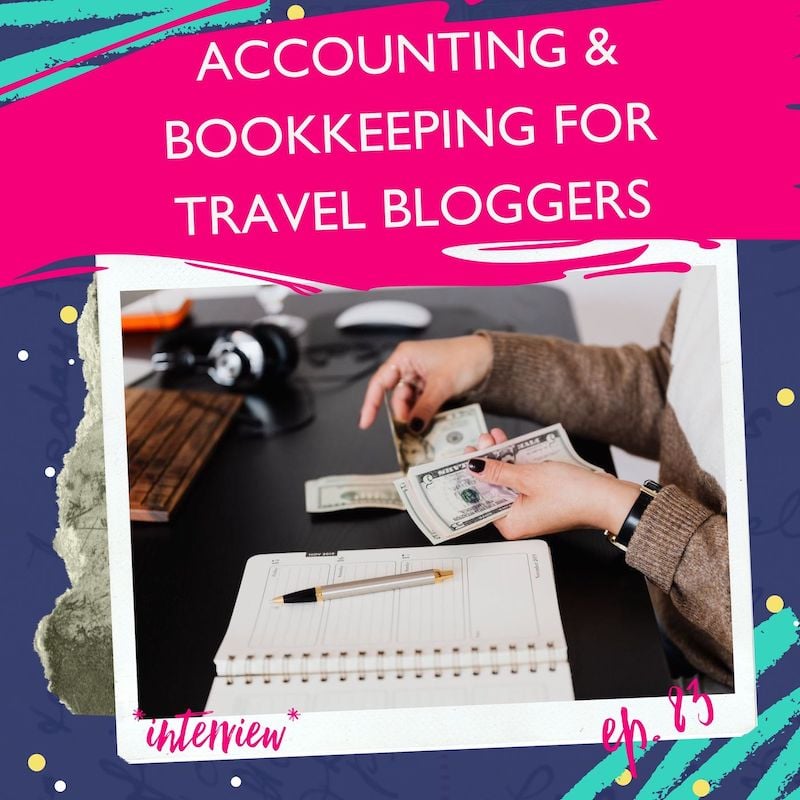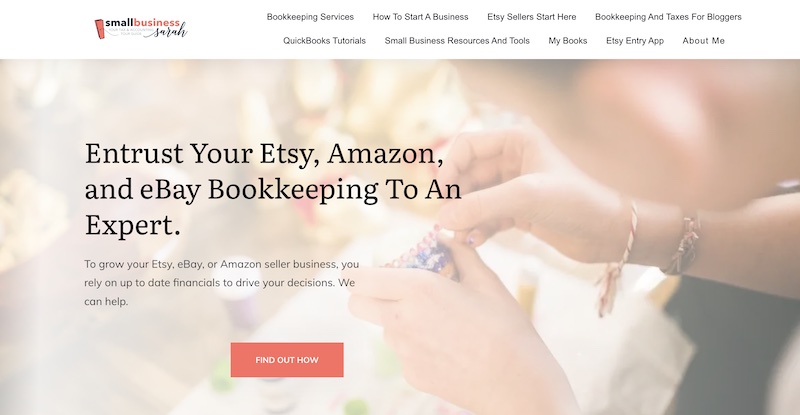Bookkeeping For Bloggers: How To Keep Your Accounting Organized [Ep. 83]
By Jessie Festa. This episode on accounting for bloggers contains affiliate links to trusted partners I think you’ll love!
Interested in understanding bookkeeping for bloggers and how to do your small business accounting?
Well, you’re in luck, as in this episode of The Profitable Travel Blogger Podcast, we’ll be going over how to organize your finances as a blogger.
Our guest for the episode is bookkeeper and accountant Sarah Korhnak, who will be sharing her best tips. By the end of this episode, you’ll understand:
- Important bookkeeping basics for beginners
- How bloggers keep track of expenses
- Accounting tools that can make your life easier
- Advice on calculating tax deductions and pricing gifted sponsorships
- Tips for how to file taxes as a blogger
- And more!
In short, if you’re confused about how to organize and streamline your accounting as a blogger, this episode can help.
Bookkeeping For Bloggers [Podcast Episode Audio]
Click here to listen on Apple Podcasts/iTunes
Click here to listen on Spotify
Click here to listen on Amazon Music
Click here to listen on TuneIn
Invite: How To Make Money As A Travel Blogger [Free Workshop]
While we’re on the topic of blog monetization, I’d love to invite you to my free workshop: 10 Powerful Ways To Make Money Travel Blogging.
During the 60-minute on-demand workshop, you’ll learn:
- Myths related to monetizing a blog (that may be holding you back!)
- Strategies for creating profitable content (so those blog posts, emails & social shares lead to income!)
- Tips for earning recurring passive revenue as a blogger (so your income grows even when you’re away from your laptop!)
- How to create products that you know your audience will buy (so you don’t waste your time!)
- Advice for growing your affiliate income (with a strategy that truly works!)
- And more!
Plus, your free ticket to this actionable workshop also includes a Q&A, limited-time replay, and special bonuses.
Click here to grab your seat in the free travel blog monetization workshop.
Organize Your Finances With These Helpful Accounting Tools:
QuickBooks. QuickBooks, a cloud based accounting software, is a great accounting tool for bloggers due to its user-friendly interface, efficient expense tracking, financial reports, and customizable features that cater specifically to small businesses and freelancers. They even offer payroll services!
Google Sheets/Excel Spreadsheets. Looking for free accounting software? If you’re just starting out and aren’t ready to pay for QuickBooks, you can use a simple spreadsheet to track your profit and loss, organize your accounting, and prep for tax season.

Bookkeeping & Accounting For Bloggers [Episode Transcript]
The following is a summary of the podcast episode sharing bookkeeping tips for bloggers. It is transcribed as best as possible, with paraphrasing included. For the full strategy on how to do your accounting and manage your business finances as a blogger, make sure to listen to the audio version of the podcast above.
We talk a lot about how to monetize our blogs. And while growing your income is a sign of a growing business, it’s also a sign that you run a business—which means you’ll need to also think about accounting and bookkeeping.
Now, I know this topic can be confusing for many creators, which is why I’m so excited for today’s guest, Sarah Korhnak from Small Business Sarah.
Sarah is a bookkeeper and accountant dedicated to helping online small business owners with their bookkeeping and taxes—and in today’s episode, she’ll be sharing tips and strategies to help you better understand how to run the financial side of your blog.

1) Thank you so much for taking the time to share your tips! To start, can you tell us more about yourself, your business, and how you got into accounting?
I’m Sarah Cornakck, an accountant with a passion for simplifying bookkeeping and taxes for small businesses. I have a degree in accounting and earned my CPA license.
I started in public accounting, but it wasn’t the right fit. As a parent, I wanted flexibility and explored various side hustles.
That journey led to the creation of my website Small Business Sarah, where I share practical content on bookkeeping and taxes for bloggers and small business owners. It eventually evolved into providing bookkeeping services for fellow business owners.

2) Let’s start with the basics. Many bloggers start as Sole Proprietors before eventually registering their business as an LLC or S Corp. What is the difference between these three entities, and when is the right time to formally register a business?
Sole Proprietorship:
- Doing business in your own name
- Simplest form, with minimal registration requirements
- Taxed the same as an LLC
LLC (Limited Liability Company):
- One step above a sole proprietorship
- Creates a separate legal entity
- Taxed similarly to a sole proprietorship
S-Corp (S Corporation):
- An actual corporation
- Significant differences in accounting and tax implications
- Completely separate entity from the owner
Considerations for choosing a business type:
For most people, starting as a Sole Proprietorship or an LLC makes the most sense.
S-Corps do come with more complicated bookkeeping and more complicated tax returns. Plus, some states have additional registration fees. For instance, California has an annual registration fee.
This means an S-Corp can actually be more expensive to register.
When to register:
- It’s advisable to register as soon as you earn your first dollar
- IRS requires reporting income, whether it’s hobby or business income
- Legal registration, even for a sole proprietorship, is recommended
- Registration requirements increase with more complex entities (Sole Proprietorship < LLC < S-Corp)
These are just some things to keep in mind when choosing the structure for your blogging business.

3) One aspect of owning a business is paying yourself. How can bloggers determine how much to pay themselves, and should this be done weekly, monthly, quarterly, or something else?
Navigating the waters of self-payment depends on your business structure. Let’s break it down:
Sole Proprietors and Single-Member LLCs:
- Taxed on net income regardless of personal pay
- Paying yourself does not alter your tax situation
- Consider paying yourself lump sums on a schedule (weekly, monthly), but the amount is at your discretion
- Tip: Avoid personal expenses on business credit cards, as it complicates matters
S-Corps:
- S-Corps are separate legal entities; owners are essentially employees
- Paying payroll is a must, so you’ll want to hire a payroll company with tax withholdings
- The IRS requires a reasonable salary for S-Corp owners
- Consult with a tax preparer, especially for S-Corp owners, to determine an appropriate salary
In essence, for Sole Proprietors and Single-Member LLCs, the flexibility exists in determining when and how much to pay yourself.
S-Corps, on the other hand, involve a more structured payroll process with a deemed reasonable salary.
When deciding which is best, it’s also wise to consider best practices for getting set up legally as a blogger.

4) Let’s say you are an S-Corp and you decide on an amount and there comes a time where you need to take out additional money. Can you take out additional funds or do you have to stick with the number that you set out to pay yourself?
Absolutely, as an S-Corp, you have the flexibility to take out additional funds beyond your set salary; however, it’s important to be aware that the taxation of these additional funds differs from your regular salary.
The tax implications may not be as favorable as those for your salary.
Considerations for S-Corp Owners:
- Additional funds are an option but come with different tax treatment
- Carefully weigh the tax implications when deciding to take out extra money
- While it doesn’t cause blogging tax issues, paying yourself as an S-Corp involves various considerations, so it’s essential to stay informed
Contrast with Sole Proprietorship or Single-Member LLC:
- In contrast, for Sole Proprietors or Single-Member LLCs, the process is simpler
- If circumstances allow, you can adjust your payments without major tax implications
- The flexibility in adjusting payments offers ease of management for these business structures
In short, S-Corp owners can take additional funds, but the tax considerations make it essential to weigh the decision carefully. Sole Proprietors and Single-Member LLCs enjoy more flexibility in adjusting payments as needed.

5) Along with having a variety of business expenses, many bloggers get paid from a variety of places – like different affiliate marketing platforms and clients. What are the important steps bloggers should take to set up a proper bookkeeping system?
Establishing a robust bookkeeping system is crucial for bloggers managing diverse income sources. Here are key steps to set up an effective system:
1. Separate financial accounts. Set up distinct business checking and credit card accounts early in your business journey. Keep personal and business finances separate for streamlined bookkeeping.
2. Choose your bookkeeping for bloggers approach. Initially, a spreadsheet might suffice for tracking expenses as you start. As your business grows, consider using accounting software. QuickBooks Online Simple Start is a preferred choice for its comprehensive features.
3. Utilize accounting software. Connect financial accounts to QuickBooks or a similar software. From there, categorize income and expenses within the software for clarity. QuickBooks Online Simple Start simplifies the process, but explore alternatives based on your personal preferences.
4. Create income & expense categories. Regardless of the tool you use, organize your revenue and expenses into categories. Examples include affiliate marketing, product sales, and specific expense buckets. This categorization helps you understand where your money is coming from and where it’s going.
5. Understand your finances. Bookkeeping is not just for tax purposes; it’s a tool for understanding your business finances. Analyze different revenue streams by creating categories like affiliate marketing or digital product sales. Similarly, use expense categories that make sense to you, providing insights into your spending patterns.
6) What documents and receipts should bloggers retain for proper record-keeping?
Maintaining organized records is crucial for bloggers, so here are some tips to do this correctly:
Electronic records. In the era of digital transactions, receipts, invoices, and payments often arrive electronically. You can simply create a dedicated folder in your email inbox to store electronic business receipts. Keeping digital copies is not only convenient but also widely accepted for efficient record-keeping.
Paper receipts. For travel bloggers or those dealing with tangible transactions, paper receipts may still be relevant. Keep a separate folder for these receipts, especially those incurred while traveling for work. This helps ensure that paper records are easily accessible when needed.

Utilize business financial accounts. When you separate your financial accounts for business, each purchase made using the dedicated credit or debit card creates a clear record. This approach not only streamlines record-keeping but also provides tangible proof of your business expenses.
Efficiency in separation. Efficiency lies in the separation of business and personal finances. By using a business credit or debit card for transactions, you create a real-time record, eliminating the need for manual sorting at year-end. This separation not only simplifies record-keeping but also aligns with IRS expectations.
7) When it comes to those receipts is a line on your credit card statement enough, or do you need an itemized receipt?
When it comes to receipts, having an actual receipt from the business is preferable as it provides an additional level of proof; however, in today’s context, the IRS recognizes that traditional receipts may not always be obtainable, especially depending on your location.
The key factor here is maintaining a clear separation between personal and business transactions. For instance, if you’ve kept your credit card transactions separate for personal and business purposes, a simple line item on your credit card statement becomes more credible.
The IRS acknowledges that receipts are evolving, and as long as there’s a distinct separation and no mixing of personal and business transactions, the need for extensive proof diminishes.
Keeping that separation is crucial for a smoother verification process with the IRS.

8) Is it ever necessary for bloggers to keep a journal to track their business expenses?
In instances where you have to pay for things in cash, it becomes more important to find ways to substantiate those transactions.
To do this, you can keep a journal and note details such as the location, date, and purpose of each transaction.
Additionally, keeping any receipt associated with cash transactions adds an extra layer of documentation for comprehensive record-keeping.
9) What are common deductible expenses for bloggers that they might overlook, and what is the best way to track and manage these?
The challenge for a travel blogger is discerning between personal and business purposes during a trip.
It’s essential to separate the portions that genuinely serve the business to accurately deduct related expenses.
Spend time considering how to make this separation and document it. You don’t want to categorize all travel expenses as personal, as they serve a business purpose. Conversely, writing off an entire trip may raise red flags during an audit if it wasn’t entirely for business.
For instance, if you’re traveling to the UK, visiting friends, and incorporating travel blogging, the entire amount may not be a deductible expense on your tax return.

Other deductions bloggers may overlook include:
Home office tax deduction. If you regularly and exclusively use a part of your house for your business, even if it’s just a 5 by 10 desk, you can deduct that portion as a home office expense on your tax return. Simply multiply the square footage by $5—which is the current prescribed rate per square foot—and report it on Schedule C.
Note: It’s crucial to ensure that the designated area is used exclusively for your business to qualify for this deduction.
Education and training. Whether it’s a blogging course, conference attendance, or purchasing an ebook on how to monetize your blog from day one, these expenses contribute to your professional development and are deductible.
General rule for deductible business expenses. The general rule for deductible business expenses is whether they are ordinary and necessary for your type of business. Consider what other bloggers in your niche might deduct, focusing on aspects ordinary to running your specific type of business. This rule serves as your guide for identifying tax-deductible expenses relevant to your blogging endeavors.
10) Along with actual income, many bloggers and influencers are compensated through unpaid trips, experiences, and gifts. In terms of blogging and taxes, are these considered income and, if so, what is the best way to price and document them?
Yes, unfortunately, the IRS acknowledges that individuals often exchange their time for goods, services, or other forms of compensation. Consequently, any barter transaction is considered taxable.
If you receive compensation such as a free hotel stay in exchange for a blog post about that hotel, the IRS deems the value of that free hotel stay as income.
It is essential to report this income at its fair market value on your tax return. For example, if the hotel stay would typically cost $150 per night, that would be the amount you report on your tax return.

11) What accounting software do you recommend for bloggers, and why?
QuickBooks Online is a really robust system. Yes, there is a bit of a learning curve; but, it’s the only bookkeeping program you’re ever going to need.
Also, every accountant, bookkeeper, and tax preparer uses QuickBooks, so if you ever need to pull in help that’s easy to do when you’re using Quickbooks.
The downside is that it does cost $35 a month, so it’s not something that you need to jump into right away. When you’re an established business owner though, it can make a lot of sense.
12) We’re starting to wind things down now, so I’d just love to know—what are the biggest mistakes you see bloggers make when it comes to accounting and bookkeeping?
The biggest mistake I see bloggers making when it comes to accounting is not separating their finances right from the start. It’s a lifesaver down the road, trust me.
And here’s the thing:
Many business owners, including bloggers, kick off their ventures not really sure if the money will roll in. They’re having a good time, money’s coming in, but without proper tracking—no spreadsheets, no bookkeeping program—they often overestimate their earnings.
People hire a bookkeeper, get their profit and loss statement, and boom! Surprise, surprise—they weren’t making as much as they thought.
So, two key things to focus on:
- Get those finances separated early
- Do some form of bookkeeping
Knowing how your business is doing is crucial. You want to get paid for the time and effort you’re putting in. Seeing those numbers in black and white helps you adjust, grow, and, hopefully, rake in more cash.

13) Thank you so much for sharing your wisdom about bookkeeping for bloggers! Before we sign off, can you let everyone know where they can find you?
- Small Business Sarah (website)
- Evergold Accounting (accounting services)
- @SmallBusinessSarah (YouTube channel)
Thank you!
Alright now I hope you enjoyed this episode. I hope you feel inspired and empowered to set up a bookkeeping system for your blogging business.
Before you go, don’t forget to grab access to the free 10 Ways To Make Money Travel Blogging workshop that I’ve linked in the show notes. If you’re looking to monetize your blog, this powerful training can help.
And of course, make sure to subscribe so you don’t miss future episodes sharing these bite-sized strategies for bloggers who want to turn their blogs into profitable full-time businesses.
Happy blogging!
Increase Your Income & Manage Your Finances With These Helpful Past Episodes:
A Streamlined Workflow For Organizing Your Blogger To-Do List
Create A Streamlined Blogging Schedule In 3 Steps
How To See Success With Affiliate Marketing For Travel Bloggers
15 Creative Ways To Promote Affiliate Links As A Blogger
How Niching Down Can Help You Grow & Monetize Your Blog
How To Find Niche Keywords By Doing Competitor Research
How To Reach Your Blogging Goals Faster With Outreach Days
How To Update Website Content For Increased Traffic
How To Plan Out A Year Of Content In One Week
Click here for all profitable blogging podcast episodes.
Connect With The Profitable Travel Blogger Podcast
Stay In The Loop
Do you want to get notified when new episodes publish?
Then make sure to opt-in for podcast email notifications sent to your inbox!
You can do that by clicking here.
Subscribe + Review (To Win A Prize!)
Love learning new blogging strategies to help grow your website traffic, community, and income?
Click here to subscribe on iTunes to be notified when new episodes publish.
I’d also be extremely grateful if you’d leave a review right here and let me know your favorite part of the episode or a takeaway you walked away with. By leaving a review, you help the show be seen by more people, helping the episodes to have a greater impact.
Bonus:
Each month, I’ll be choosing one reviewer at random to win a FREE seat inside one of my masterclasses.
Winners can choose from:
- How To Grow Your Blogging Income Through Facebook Ads
- How To Land Paid Press Trips As A Travel Blogger
- How To Make Money (Fast) With Affiliate Marketing
- How To Start A Tour Company In Your Own Backyard
- How To Start A Blog, Grow An Audience & Make Money
- Build Your Blogging Profit Plan Masterclass
Winners will be chosen at random from the reviews and will be notified via email, so make sure to send me — jessie (at) jessieonajourney dot) com — your email address so I have it.

